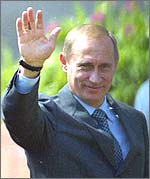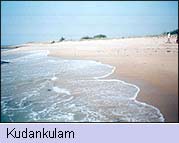| HOME | NEWS | SPECIALS | ||||


|
|||||||
|
Part 3
The Russian ConnectionGeorge Iype
The first Russian president to do so, Putin's gesture and public announcement that Moscow is willing to extend co-operation in this sphere to New Delhi virtually broke the international nuclear blockade against India. The reverberations of Putin's visit can be felt far away, down South, at Kudankulam village in Tamil Nadu. It is here that India's largest nuclear power plant is coming up -- with technical aid from Russia. It is for the 2,000 MW Kudankulam Nuclear Power Station that India has signed a US $ 3.1 billion (Rs 114 billion) deal with Russia. Russia will deliver two standard high-pressure VVER 1,000 water-cooled and water-moderated reactors that will produce 1,000 MW power per unit. To begin with, Moscow will extend a US $2.6 billion credit to India at four per cent annual interest to be paid back over 12 years, after the first reactor is commissioned. The credit would be returned in hard currency and clearing dollars. Both sides are yet to decide on the exact proportion of the repayment scheme. Twenty-three atomic energy institutions in Russia are now working on the Kudankulam project. According to the agreement, Russia will supply all equipment and material, including fuel for the entire life of the power station. India need only construct access roads and buildings and take care of other support activities. The Nuclear Power Corporation of India Limited will manage the Kudankulam project. IT was in 1988 that then Soviet leader Mikhail Gorbachev and then prime minister Rajiv Gandhi signed the deal in Delhi. Since then, Russia has been lobbying to finalise the pact. But a section of officials at the Department of Atomic Energy had sternly opposed it. "It is incredulous that India had the courage to ink the deal in 1988, just two years after the nightmarish Chernobyl accident," says S P Udayakumar, an anti-nuclear activist who founded the Group for Peaceful Indian Ocean in 1988 to educate the public against nuclear weapons. Critics argue that the nuclear energy pact will only boost the Russian nuclear industry. "Nuclear power generation in India has not succeeded because it requires stable grids. The existing grids in the country cannot handle the output of a 1000 MW unit from Kudankulam. So there is no logic in going ahead with the deal," says a senior DAE official. They say the Kudankulam project will harm India's autonomous nuclear programme, break the country's control of the nuclear fuel cycle and create unnecessary dependency. The deal had dragged for the past 12 years because a section of DEA officials and successive governments at the Centre cold-shouldered it. Another reason was pressure from the United States.
Again, in June 1998, soon after India exploded the nuclear bombs, the US publicly said that the Russian decision to build nuclear reactors in Kudankulam was not good news, that it sent the "wrong signal at the wrong time". Then US state department spokesman James Rubin said: "Even before the latest test, we urged Russia not to proceed with the reactor sale to India, as it is not consistent with Russia's obligations as a member of the Nuclear Suppliers Group [which should] not to sell reactors to countries that don't have the so-called full scope safeguards on all facilities." THE Indo-Russia deal has, thus, stirred up a heated debate. Many ask a crucial question: Why is India depending on Russia for nuclear power reactors? Why Russia? Official sources claim India agreed to purchase the technology not because of its superiority but because Russia has smartly linked the nuclear reactor purchase with other defence deals. This includes purchase of T-90 tanks for the Indian army, the SU-30 planes for the air force and the Russian aircraft carrier Admiral Gorshkov for the Indian navy. A top-ranking defence official said that India is planning to purchase a nuclear submarine reactor and that the purchase of the reactors would help in this. But experts see no technical merit in India going for the VVER 1,000 reactors. When the idea of the purchase came up a decade ago, the Indian Atomic Energy Regulatory Board had expressed misgivings. In the past, many European countries have abandoned the VVER 1,000 reactors because they have problems with pressure vessels, emergency shutdown systems and team generators. "The reactors that Russia is going to export to us will be difficult to maintain," says a senior AERB official. The official adds that in 1997, Dr Alexy Yablokov, Chairman of the Russian National Ecological Security Council, had admitted that the Russian reactors were 'highly unsafe.' BUT proponents of the Kudankulam project are confident that the two reactors would add substantially to the southern grid and promote social and economic development in the region. "The Russian reactors are superior in quality and safety standards," says S K Jain, director of the Kudankulam project. Immediately after the Chernobyl accident, Jain continues, European countries had shut down the reactors supplied by Russia saying its nuclear power programme was very secret, full of defects and had many grey areas. "But then the Russians opened up and presented their reactors to the international community. Now there is no need for us to worry about the safety and health aspects," he concludes. But while Indian officials go ahead with such claims, Russians themselves admit that they do not have the money and resources to manage some of their outmoded reactors. In April last year, Sergei N Ivanov, director general of the Russian Electric Power Company that operates 29 nuclear power plants, said his enterprise "lacked money to pay workers, perform maintenance and repairs, inspect crucial pipes and even buy fuel." "At times the plants have only two or three days of fuel on hand," he said. The New York Times reported on April 12, 1999: 'The Russian company would like to close nine of its older reactors, but it says it has no money for decommissioning them. It says its best prospect for earning that money is build additional reactors and sell the power.' If Kudankulam is an example of that, India is at the receiving end of Russian nuclear business.
ON TO PART 4
Return to Darkness at noon
EXTERNAL LINKS
Page design: Dominic Xavier
|
||||||
 Russian President Vladimir Putin attracted considerable international attention when he visited the Bhabha Atomic Research Centre, Trombay, the nerve centre of India's nuclear establishment.
Russian President Vladimir Putin attracted considerable international attention when he visited the Bhabha Atomic Research Centre, Trombay, the nerve centre of India's nuclear establishment.
 And the Americans have been open about it. In 1997, US President Bill Clinton pressured his Russian counterpart Boris Yeltsin at the Helsinki Summit to refrain from building the reactors in Kudankulam. The same year, American Vice-President Al Gore took the issue up with then Russian Prime Minister Viktor Chernomyrdin during a session of the bilateral joint commission.
And the Americans have been open about it. In 1997, US President Bill Clinton pressured his Russian counterpart Boris Yeltsin at the Helsinki Summit to refrain from building the reactors in Kudankulam. The same year, American Vice-President Al Gore took the issue up with then Russian Prime Minister Viktor Chernomyrdin during a session of the bilateral joint commission.
